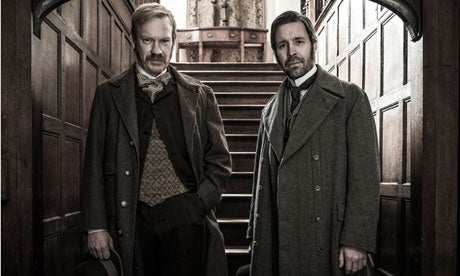TV review: Olivia Colman can do no wrong - But The Suspicions of Mr Whicher (ITV) was a mistake
United States of Television: America in Primetime, Sat, BBC2

Your support helps us to tell the story
From reproductive rights to climate change to Big Tech, The Independent is on the ground when the story is developing. Whether it's investigating the financials of Elon Musk's pro-Trump PAC or producing our latest documentary, 'The A Word', which shines a light on the American women fighting for reproductive rights, we know how important it is to parse out the facts from the messaging.
At such a critical moment in US history, we need reporters on the ground. Your donation allows us to keep sending journalists to speak to both sides of the story.
The Independent is trusted by Americans across the entire political spectrum. And unlike many other quality news outlets, we choose not to lock Americans out of our reporting and analysis with paywalls. We believe quality journalism should be available to everyone, paid for by those who can afford it.
Your support makes all the difference.It is the considered opinion of this column that Olivia Colman can do no wrong. It's also its considered opinion that she's just made a mistake, a rare one in a career that's so far been marked by what the X Factor crowd would call great song selection. Whether by happy accident or canny judgement, the shows Colman has appeared in have displayed her talents brilliantly, beginning with comedies that showed how vividly she registers, even when she's in the background, to dramas that revealed the intensity of her acting. But I'm not sure you can add The Suspicions of Mr Whicher to the list – a sequel to an earlier dramatisation of Kate Summerscale's book about a notorious case involving a real Victorian detective. If it's any consolation to her, she isn't the only good actor to have been led astray, since the excellent Paddy Considine is back as the moody Whicher, who has left the Met and now appears to take new cases on the basis of personal curiosity and serendipity.
I'm not entirely sure what's gone wrong here. It's written by Neil McKay, who was deservedly nominated for a Bafta for Appropriate Adult, his drama about the interrogation of Fred West, and it doesn't look as if ITV have skimped on the budget. But you can't quite shake the feeling that it's one of those projects that was nobody's first choice. Why was it made? Because the first one performed pretty well, I'm guessing, and there's always a steady market for gas-lamp detection, as Ripper Street recently demonstrated. But that isn't enough to make it fly, and it doesn't help that the plot feels arbitrary in its twists and turns.
Colman plays a woman looking for her missing niece, rescued by Whicher from a den of low coves and mutton-chop-whiskered toughs. When the girl turns up on a mortuary slab, he agrees to find out what's happened to her – a hunt that takes him through a Victorian London framed more by gothic fiction than the historical record. There are glarey nuns who look at him as if he's a flasher and a high-walled asylum presided over by a smoothly villainous alienist. And in scene after scene, people behave in ways that are just a little off, as if the tuning has gone. I'm afraid even the wonderful Olivia Colman can't make the lines seem more than functional, a bit of clockwork to get you to the next plot revelation.
The problem with Whicher as a character may be that he doesn't have enough problems, barring a certain melancholy about past bereavements. Because, as the final episode of The United States of Television: America in Primtime reminded us, we prefer our heroes to be flawed these days, and occasionally deeply so. What was traced here was the trajectory from Dr Kildare – a pin-up of medical integrity – to House, Hugh Laurie's pill-popping misanthrope. It's an arc from white-hat simplicity to psychological ambiguity and – in the case of Dexter and Omar from The Wire – outright criminality. And whereas ethical judgement used to come running through the story, it's now been delegated to the audience. It's been an almost entirely benign development if you value complexity and nuance in the stories you see on screen. But it has to be said that audiences don't always get the judgements right.
The writers of 24 may have intended Jack Bauer to be an ambiguous character, but a vast proportion of the audience took him as a pretty uncomplicated hero, prepared to do what lesser men wouldn't. Ditto Dexter, who implicitly makes the case that it's fine to torture people to death as long as they're the kind of people who like torturing people to death. Hooray for David Simon, who spotted the flaw in the proposition and refused to endorse the vindictive violence that lurks at the heart of that series. It is the considered opinion of this column that he can do no wrong.
Join our commenting forum
Join thought-provoking conversations, follow other Independent readers and see their replies
Comments